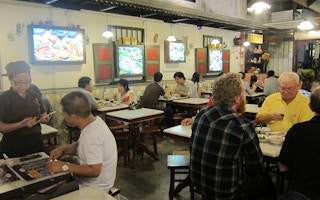At the end of a 14-hour day spent behind the sweltering stove in his bak kut teh stall, Tan Jun Yuan peered into his pot of pork bone soup.
To continue reading, subscribe to Eco‑Business.
There's something for everyone. We offer a range of subscription plans.
- Access our stories and receive our Insights Weekly newsletter with the free EB Member plan.
- Unlock unlimited access to our content and archive with EB Circle.
- Publish your content with EB Premium.
There were still about five servings left over from the day’s business. It was a waste to throw them out, but donating cooked food to a charity would have been problematic as well as the food could go bad.
Wishing he could offer an ad-hoc discount to entice last-minute customers and clear out his stock, the business-trained Tan hit upon the idea of creating a mobile app that would link customers with eateries that wanted to offer limited-time deals.
Instead of putting up posters or standees to promote their special offers, eateries could use technology to reach out to people nearby, sell their food, and prevent food waste.
Together with his two business partners, the 30-year-old launched the app 11th Hour last month, which aggregates deals from close to 200 of its partners - including restaurants, pubs, cafes, and bakeries - who pay a fee to list their deals at any given time of day.
Under the app’s rules, eateries that list their promotions must price products at least 30 per cent cheaper than regular price.
It has been a hit with diners. As of mid-November, 11th Hour had over 6,000 downloads to Android and iOS devices, purely through word of mouth.
Now working full-time as CEO and co-founder of 11th Hour, he says: “Merchants can create a last-minute deal in under 30 seconds and push it out to users in the vicinity. Diners log in and can see all the different deals around them sorted by distance.”
11th Hour partners are also able to see how many people have viewed their deals.
“
Just order less. Just say, ‘Can I have less?’ Maybe you can’t donate food to people in poor countries, but the least you can do is not to waste.
Tan Jun Yuan, CEO and co-founder, 11th Hour
Food waste is a pressing issue in Singapore, a city-state of 5.5 million people. According to statistics from the National Environment Agency, Singapore threw out some 785,500 tonnes of food waste in 2015.
A study conducted last year by students under the Chua Thian Poh Community Leadership Programme from the National University of Singapore found that 90 per cent of Singaporeans are concerned about food waste produced by food and beverage companies, while more than 83 per cent disagreed with the statement that it is acceptable for such businesses to throw away unsold, excess or near-expiry food that can still be consumed.
Even the restauranteurs think it’s a shame to throw away unsold food that is otherwise perfectly edible. Tan says: “I think anyone who works in the food and beverage industry knows there is the problem of food waste. But there’s a sense of helplessness - what can I really do about it? And then what’s the benefit of tackling food waste?”
11th hour has helped several eateries tackle this problem, such as juice cafe Eat Ripe Products in Little India.
Its owner, Darren Chai, who has been using the app since the beta-testing phase says it has helped him reduce food waste by 20 per cent. New customers have also popped in.
“Reducing food waste via technology like this is a win-win situation for us,” he says.
A personal mission
Meanwhile, 11th Hour is working with local supermarket chains and wholesalers to see how the last-minute deal principle can work out for grocery shopping.
Tan says that his team would begin reaching out to food sellers in local food centres - known as hawker centres - and hotels in the near future.
The team will also add new features to the app, including redemptions and reservations. “(Partners) have told us they don’t just want to see how many people have seen the deal, they want to know how many people have come down as well.”
Tan wants to take 11th Hour to other countries, starting with Vietnam where the app’s development team is based. “But I think it’s the developed cities that are the biggest culprits of food waste, such as Hong Kong,” he said.
In daily life, Tan says people could reduce food waste by asking for less rice, for instance, but rarely do.
He also avoids buffets, which he calls a “lose-lose” situation. “I force myself to eat a lot more than I can really eat and there are still all these leftovers anyway.”
He adds that saving food only requires a simple action. “Just order less. Just say, ‘Can I have less?’ Maybe you can’t donate food to people in poor countries, but the least you can do is not to waste.”

















